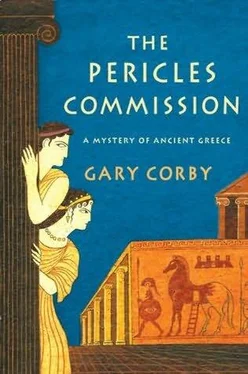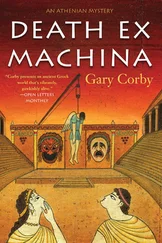Gary Corby - The Pericles Commission
Здесь есть возможность читать онлайн «Gary Corby - The Pericles Commission» весь текст электронной книги совершенно бесплатно (целиком полную версию без сокращений). В некоторых случаях можно слушать аудио, скачать через торрент в формате fb2 и присутствует краткое содержание. Жанр: Исторический детектив, на английском языке. Описание произведения, (предисловие) а так же отзывы посетителей доступны на портале библиотеки ЛибКат.
- Название:The Pericles Commission
- Автор:
- Жанр:
- Год:неизвестен
- ISBN:нет данных
- Рейтинг книги:5 / 5. Голосов: 1
-
Избранное:Добавить в избранное
- Отзывы:
-
Ваша оценка:
- 100
- 1
- 2
- 3
- 4
- 5
The Pericles Commission: краткое содержание, описание и аннотация
Предлагаем к чтению аннотацию, описание, краткое содержание или предисловие (зависит от того, что написал сам автор книги «The Pericles Commission»). Если вы не нашли необходимую информацию о книге — напишите в комментариях, мы постараемся отыскать её.
The Pericles Commission — читать онлайн бесплатно полную книгу (весь текст) целиком
Ниже представлен текст книги, разбитый по страницам. Система сохранения места последней прочитанной страницы, позволяет с удобством читать онлайн бесплатно книгу «The Pericles Commission», без необходимости каждый раз заново искать на чём Вы остановились. Поставьте закладку, и сможете в любой момент перейти на страницу, на которой закончили чтение.
Интервал:
Закладка:
But if Ephialtes was killed to stifle the democracy, then the plot failed, because when they killed Ephialtes they replaced a great statesman with a political genius. Ephialtes had a lieutenant, a rising young politician by the name of Pericles.
Pericles held it together. Somehow. It must have been a challenge even for him, but Athens didn’t collapse, didn’t fall into civil war, and didn’t lose its democracy.
Pericles was the son of two great political families. His father Xanthippus was a hero of the Persian Wars, and a member of the Council of the Areopagus. His mother was the niece of Cleisthenes, the man who had begun the drive for democracy fifty years before, and descended of an ancient lineage that had held power in Athens in ages past. Pericles was as close as you could get to aristocracy in a city that, technically, didn’t have any. But he was also a political radical, and when Ephialtes went down, Pericles stepped into the breach.
Perhaps the greatest joy of writing a book like this is interweaving fiction into the fabric of truth. Nicolaos didn’t exist. Socrates had no known full siblings, and yet, Nicolaos would not be impossible. The fact that Nicolaos doesn’t show up in the historical record is no objection. The period is poorly documented and even some quite prominent men have only a few lines in the histories. When you throw in the fact that Nicolaos is doing discreet investigation…of course no one has heard of him until now.
We do know the parents of Socrates (and Nicolaos) were Sophroniscus and Phaenarete. By popular tradition Sophroniscus was a “polisher of stone,” which is code for a sculptor in marble. I’ve accepted the tradition as true in the absence of anything better, though there’s a fair chance it’s apocryphal; the family trade isn’t mentioned anywhere until the following century. Phaenarete was a midwife, which we know for sure because Plato says so in Theaetetus, one of the many books he wrote featuring Socrates.
A surprising piece of trivia is the family of Socrates and the family of Pericles had friends in common. In Laches, Plato names Lysimachus, the son of a famous statesman, as a close friend of Sophroniscus, in which regard he dines with the family in The Pericles Commission. The connection is surprising because Pericles and Xanthippus were wealthy landholders and Sophroniscus was, at best, a middle-class artisan.
The trial of Nicolaos descends into farce, but there is very little that happens at his trial that did not happen at one time or another. Athenian juries were huge: the minimum size was 101 jurors, and numbers as high as 501 were perfectly normal. The 1,001 jurors who hear Nico’s trial is high, but not surprising considering the importance of the case. For comparison, the number of jurors who heard the infamous trial of Socrates sixty years later is usually given as 501, but that’s because 501 was the average jury size for a case of heresy.
When Euterpe rips off her dress before the jurors, she is anticipating by more than a hundred years the trial of Phryne the hetaera. Phryne was the most sought-after courtesan of her day and a stunning beauty. Praxiteles, the greatest sculptor of ancient times, used Phryne as the model for his most famous work, the Aphrodite of Knidus. This got Phryne into trouble. By posing as Aphrodite she was claiming to be as beautiful as the Goddess of Love. Phryne was charged with impiety, the same charge that had got Socrates killed.
Needless to say, the best lawyer of the day was among her lovers. Hyperides struggled to save her, but he was failing because the complainants had her dead to rights; for a mortal to pretend to divine attributes was a crime. It looked like Phryne would be sent to her death. With nothing to lose, Hyperides walked over to Phryne, standing in the court, and in one movement ripped down her dress.
The entire (all male) court took a close look at Exhibit A.
The charges were dismissed.
Phryne thus became the only woman in history to be declared divinely beautiful, by order of court.
I stole this famous incident wholesale for Euterpe. Or an alternative explanation is Hyperides, who as a lawyer had a fine appreciation for precedent, recalled Euterpe’s dramatic gesture of a hundred years before and was inspired to try the same for his own client.
Pythax is my invention, but the Scythian Guard was very real. The Scythians were a barbarian people far to the north. The Scythian Guard of Athens was created after the Persian Wars when three hundred slaves, supposedly Scythians, were bought for the purposes of crowd control within the city. We know this from the works of two orators called Andocides and Aeschines. The trick of using a painted rope to quell the rioting mob outside the house of Xanthippus was standard operating procedure and apparently worked very well. The Scythians frequently used the same method to herd reluctant citizens to vote at the Ecclesia and is described in the comic play The Acharnians by Aristophanes.
The bow was the favored weapon of the Scythians and they carried it unstrung when on patrol, as a baton with which to beat, which they would happily do if faced with a disorderly drunk. By the time of Nicolaos it’s unlikely the Scythian Guard were in fact all Scythian. Their numbers would have been replenished with whatever suitable slaves came to hand. It may seem odd that the Athenians allowed slaves to push them around, but the reason Nicolaos gives in the book is correct: it was illegal for one citizen to lay hands on another, but it was legal for a slave under approved circumstances.
There was no police force as we know it. If a crime was committed, it was up to a private citizen to charge the criminal and prosecute him in court. It’s not even certain there was a jail at the time, because there was no such thing as a prison sentence. Criminals were killed, fined, or exiled. There were no other options. I created the holding cell because it makes sense there was one to hold the condemned.
Diotima was a real person, but what little we know of her comes from only one source: a famous book by Plato called Symposium. In it, Socrates credits “Diotima, a priestess of Mantinea,” as one of his early teachers of philosophy. The only other woman listed among Socrates’ teachers is Aspasia, the future wife of Pericles and a genius of rhetoric (which we know from Plato’s Menexenus). This was a world where women received no education. It took enormous natural talent for any woman to rise above such repression.
Diotima must have had a towering intellect for Socrates to speak proudly of being her pupil, and for Plato to have passed it on as simple fact. One wonders how a priestess from another city could have been teaching the young Socrates anything, but obviously it happened, and my answer to the question is as likely as any other.
The inheritance law that forces Diotima to marry Rizon was quite real. It was an absolute imperative of Athenian inheritance that property remain within the family. This, and the rule forbidding women to own property, combined on rare occasions to cause chaos. If there was a son to inherit then there was no problem, but if the only possible heirs were all female, then a search was made for the closest male relation of any sort. The heiress was then required to marry the distant relative, even if she had to divorce to do so, and the man was required to marry the heiress, even if he had to divorce.
Pericles himself was trapped by this rule. He was forced to marry a woman he disliked when an obscure relative, presumably the woman’s father, died, leaving her an heiress. She had to divorce her existing husband to marry Pericles. They suffered an unhappy marriage until Pericles met Aspasia and fell madly in love with her. At this point things got a bit complex, but he was able to divorce his wife with her agreement because she’d borne him an heir, and Pericles took up with Aspasia. They became one of the world’s first power couples, and the ex-wife married the son of Callias.
Читать дальшеИнтервал:
Закладка:
Похожие книги на «The Pericles Commission»
Представляем Вашему вниманию похожие книги на «The Pericles Commission» списком для выбора. Мы отобрали схожую по названию и смыслу литературу в надежде предоставить читателям больше вариантов отыскать новые, интересные, ещё непрочитанные произведения.
Обсуждение, отзывы о книге «The Pericles Commission» и просто собственные мнения читателей. Оставьте ваши комментарии, напишите, что Вы думаете о произведении, его смысле или главных героях. Укажите что конкретно понравилось, а что нет, и почему Вы так считаете.












